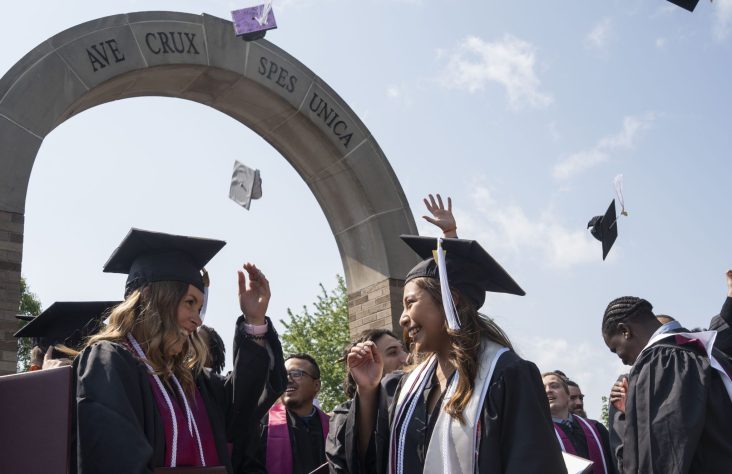October 12, 2011 // Uncategorized
On Blessed Pope John Paul II …
‘Thank you for the visit.’
It was the last of the five “ad limina” visits I was privileged to have with that great athlete of Christ, Pope John Paul II. I knew he spoke with great difficulty, so I deliberately did most of the talking — thanking him for what his pontificate had meant to the Church and how inspiring it was to me. He looked at me with those deep eyes and at the end simply said to me in a clear voice, “Thank you for the visit.”
I recall with joy my time with Pope John Paul during the “ad limina” visits and also when I concelebrated with him and other bishops during his pastoral trips. They were moments filled with grace.
I always thought of him as a saint and found it a joy to be in his presence. So manly. So warm. So intelligent. Filled with love for God. So devoted to Mary. So open to others. Always eager to learn. Always joyful. Truly a “witness to hope.”
First there was Boston in 1978. In the rain. “America, the beautiful,” he said. “Beautiful even in the rain!” But I didn’t fully understand that late October night until I led a retreat about five months later in a small house near the Atlantic Ocean. Harvard undergraduates were there and they were still talking about him and how they went back to their dorms and analyzed his homily on the rich young man in the Gospel.
That story of the rich young man (Mt 19: 16-26), he used throughout his pontificate and made it central to his historic encyclical on the great moral issues of our time — “veritatis splendor,” “The Splendor of Truth.” There were two things evident that night on the historic Boston Common. One was his love for young people, while the other was the fact that he challenged them, asking them for spiritual greatness and not to be satisfied with mediocrity. It was the key to so much that followed in his historic pontificate.
I still hear the strong voice echoing out over the old city of Boston, “Youth of America, do not go away sad. Do not go away sad on drugs. Do not go away sad on sex. Do not go away sad on money.” There was an evangelizer in our midst, and the rain became secondary. We knew we were blessed to be there. A night never to be forgotten.
An old Spanish mission
We were up early on a lovely spring morning in 1987, the bishops of this country going south by bus to one of the old Spanish missions in California, where we had Morning Prayer with John Paul II. Shortly he joined us in what looked like a school cafeteria. There were four talks, to which he responded. I remember it like it was yesterday.
One archbishop spoke in a way that seemed touched by a certain hubris and told the Holy Father that we had the best educated laity in the world. Professionals. Lawyers. Physicians. Scientists. The pope said this was true, but then taking a clear theme from the Second Vatican Council about the vocation of the laity in transforming the world, he said, “Have you transformed the culture, have you transformed the culture of film, of the media and journalism?” Again, a challenge for us.
Another archbishop spoke about the difficult moral issues of the time. In his reply, the pope reminded us of our teaching responsibility. He told us that we should teach on these difficult moral issues in a way that would attract people, so they could be attracted to the beauty of the truth contained in the teaching. He used the word “attract” or “attraction” twice. I verified it recently.
A few months later, at the “ad limina” visit, I was with about 14 bishops from our Midwest region at lunch with the Holy Father. I have often heard that the office of the papacy was a very lonely life. It was not lonely for Karol Wojtyla. He loved company, and he loved to be with bishops. The four times I had lunch with him, were unforgettable moments of grace. Being with him helped you to understand more deeply the vocation of the bishop.
I said to him, “Holy Father you told us in California in response to one of the bishops that we should teach on these difficult moral issues so that people are attracted to them, and see the beauty of the teaching. But how do we do this?” He became quiet. The philosopher came out, and so did the priest. Here is his response. I remember it exactly. When he finished, we all were quiet.
“It is necessary,” he said, “to understand the soul of the woman. All these things which were meant to liberate her: premarital sex, contraception, abortion; have they liberated her or have they enslaved her?”
He was a pastor who lived close to Jesus Christ. His life was strengthened by prayer and study. He understood the crisis of our times and he knew how to respond to it.
I shall try to add a few thoughts to these next week as we continue to mark, under the guidance of our bishop, the liturgical observance of John Paul II now declared “Blessed.”
The best news. Delivered to your inbox.
Subscribe to our mailing list today.





